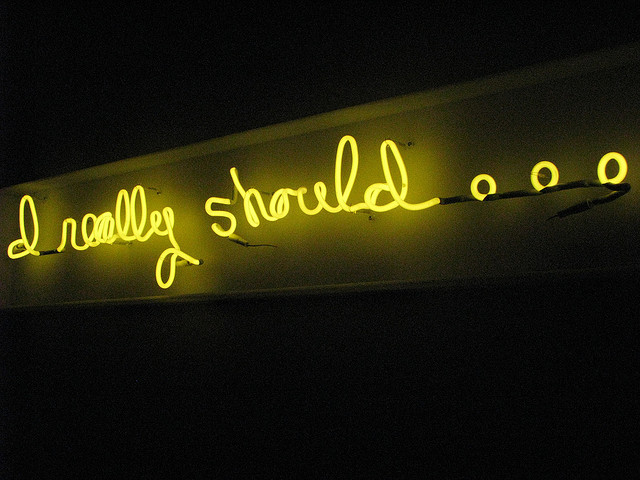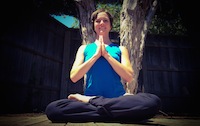Our words are a reinforcement of our thoughts and our thoughts influence our emotions, both of which determine our actions, the results of which create more thoughts and feelings.
In cognitive behavioral therapy, or CBT, thoughts, words and actions form a triangle.
Any one of these points of the triangle can influence any one of the others.
Purposefully changing any of these areas changes any one of the others.
I believe that mindfully choosing our words can lead to more beneficial feelings, thoughts and actions. One example of that I’ve been working on recently is whether I choose “should” or “could” when talking about myself and others.
I first learned of the detrimental effects of the word “should” while participating in CBT as part of a larger therapy program. I’ve struggled with depression and anxiety for much of my life. Although I had a good childhood, I became increasingly morose and self-critical as I aged.
After my mother died in 2007, my depression got much worse, and eventually I sought help.
Like many people who suffer from depression, I often used the word “should” when talking to or about myself. One of the reasons I had avoided therapy initially was because I told myself, “I should be able to deal with it on my own.” The counselor who led the CBT sessions joked that if we said “should” too much, we would end up having a “shouldy day.”
After completing therapy I changed careers from finance to yoga. I had been dissatisfied with my work ever since I finished college, but the inner critic kept telling me, “I should put my degree to use and work a corporate job like everyone else.”
Therapy helped me to finally break out of this type of harsh self talk. During my yoga teacher training, I discovered Louise Hay’s book, “You Can Heal Your Life.” In it, Hay reveals that no matter what the issue her clients come to her with for counseling and guidance, she always works on only one thing: loving the self.
As part of learning to love the self, she advises her clients to drop the word “should” from their inner monologue.
A few weeks ago, I read several passages from this section aloud to my yoga classes. I challenged my students, and myself, to notice how we felt when we said “should” and compare it to saying the same statement, while replacing it with “could.”
I expected that it would make us all feel better, less anxious and less stuck. And it did. When I caught myself saying “should,” either mentally or verbally, I stopped and replaced it with a “could.” I felt a little lighter, like some pressure had lifted off my shoulders. I felt kinder and more compassionate towards myself. I also noticed that I tended to do a chore sooner if I told myself I could do it compared to when I said that I should do it.
“I should clean the cat litter,” became “I could clean the cat litter.” And somehow cleaning the cat litter seemed not so bad. “Could” took away the sense of dread that tinges “should.” I was giving myself a choice.
No one likes to be told what to do, even when it’s you who’s doing the telling.
But it isn’t just about shoulding on ourselves, we sometimes should on other people too.
I noticed a big difference when I used the word in my thoughts and words about others. Could felt less judgmental and gave me more space to accept that their truth may be different from mine. “She should stop complaining” became “she could stop complaining.” Now I was mentally giving her a choice. It reminds me that it’s the other person’s decision, not mine.
Gabriel Bernstein recommends saying, “I release you,” toward anyone you’re in a relationship with. She says this mantra is about giving up control, opening up to different options and acceptance. “Should” forces the other person onto your path. “Could” allows them to walk their own.
During my real life “find and replace” game, I noticed that changing my words did indeed have an effect on my thoughts and even actions. It’s an ongoing process, and shoulds still creep into my words, and especially thoughts. When that happens, I try to catch myself and make a new choice. It’s not easy, but the results are worth the effort. I feel so much better when I’m not full of should.
~
~
Love elephant and want to go steady?
Sign up for our (curated) daily and weekly newsletters!
Apprentice Editor: Brenna Fischer/Editor: Emily Bartran
Image: Flickr












Read 3 comments and reply